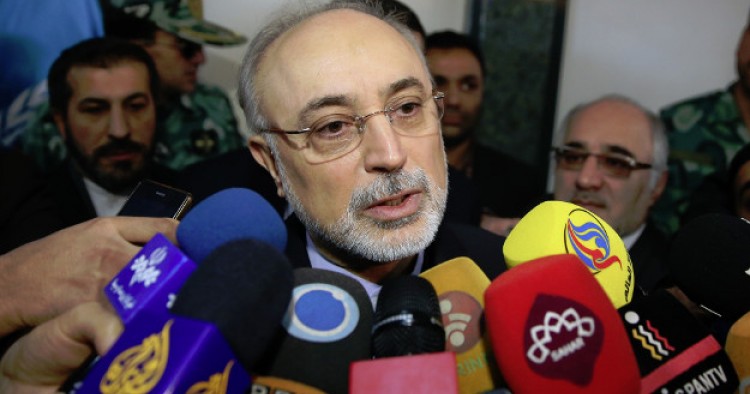The top Iranian nuclear official has warned that his country can resume high-level uranium enrichment within days if the Trump administration annuls the nuclear agreement Tehran signed with world powers two years ago. “This is not an empty threat,” Ali Akbar Salehi said in a Tuesday interview with the Islamic Republic of Iran Broadcasting, backing President Hassan Rouhani’s similar remarks last week. Salehi claimed that Iran can enrich uranium to 20 percent within five days at the Fordo Fuel Enrichment Plant, and pointed out that preserving the Fordo facility was one key strength of the nuclear accord. “They were insisting we shut down Fordo,” he added. Salehi further noted that preserving such a capability has significant messages both in technical and professional terms, and maintained that “the other side” knows it. He concluded by saying that Iran prefers to stick to the deal but not at any cost, warning that the Islamic Republic’s response would “surprise” the violators of the accord.
Salehi also cautioned the Trump administration that walking away from the U.N.-endorsed nuclear accord would tarnish America’s credibility around the world.
Comment: Salehi’s remarks were aimed at both threatening the Trump administration about the consequences of canceling the nuclear deal and placating critics at home who are increasingly criticizing the Rouhani administration for having compromised the country’s nuclear capabilities by negotiating with “untrustworthy” U.S. government.
Last week, Rouhani echoed similar remarks. He warned that Tehran would restart the country’s nuclear program within hours if the U.S. government imposes additional sanctions on the Islamic Republic, as reported in the Iranian media. “America’s new statesmen should know that the failed experience of sanction and coercion brought their previous administrations to the negotiating table. If they are inclined to repeat that experience, we will return to a more advanced situation than the pre-negotiation one – not in a matter of weeks and months, but within hours and days,” the Iranian president said in a speech to the Iranian Parliament as he was introducing his new cabinet nominees.
The rising tension between Washington and Tehran over the latter’s ballistic missile activity and support for terrorism has put the future of the Iran nuclear deal in serious doubt. While the Trump administration last month certified that Tehran was in compliance with the terms of the nuclear deal, it announced new sanctions against the Islamic Republic and emphasized that the administration was “deeply concerned about Iran's malign activities across the Middle East which undermine regional stability, security and prosperity." The U.S. media also reported that Trump only reluctantly agreed with the certification and is considering abandoning the accord as the administration is currently reassessing U.S. overall policy toward Iran.
Iranian leaders have made it clear in the past that Tehran will not renegotiate the nuclear deal with the United States and other world powers. Last week, the head of the Atomic Energy Organization of Iran (A.E.O.I.) warned that Tehran would keep all options on the table if Washington walked away from the nuclear agreement. In an interview with Lebanon’s Arabic-language Al-Mayadeen TV, Ali Akbar Salehi said the nuclear accord is an international document and it will be difficult for the Trump administration to cancel the deal. But he emphasized that Iran will respond proportionately to U.S. actions and will consider all options if Washington abandons it. Salehi claimed that Iran’s nuclear activities are advancing better than any time in the past, including enriching uranium, producing heavy water, designing a new reactor with China’s help, and extracting uranium mines. He has also noted that Tehran can resume 20 percent enrichment quite easily.
Recently, Tehran has stepped up diplomacy with other five signatories of the nuclear accord – Germany, Britain, France, Russia and China – to pressure Trump not to annul the deal. Yesterday, Rouhani discussed the issue with his Russian counterpart Vladimir Putin; and Iranian Foreign Minister Javad Zarif has also cultivated closer relationships with European governments to have their backing if Washington decides not to be part of the deal anymore.
Rouhani is also under increasing pressure at home from hardliners who argue that the nuclear deal has not benefited Iran. This is because while most of nuclear-related sanctions on Iran were lifted in January 2016, remaining unilateral American sanctions have dissuaded many international banks and companies to do business with Iran. The latest U.S. sanctions have further reinforced hardliners’ argument that the Rouhani administration should not have trusted the United States and reached an agreement with it on the country's nuclear program.
The Middle East Institute (MEI) is an independent, non-partisan, non-for-profit, educational organization. It does not engage in advocacy and its scholars’ opinions are their own. MEI welcomes financial donations, but retains sole editorial control over its work and its publications reflect only the authors’ views. For a listing of MEI donors, please click here.












